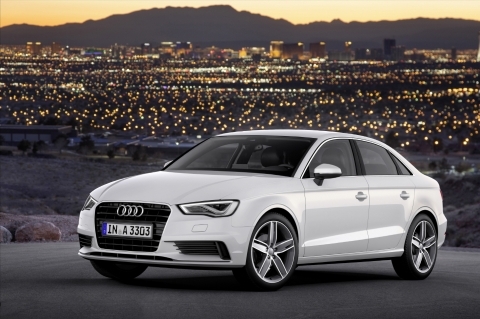The government said Wednesday that it will retest the fuel economy of diesel-powered Audi A3 and the new A7 cars as early as in November in response to the escalating emission-fixing scandal involving Volkswagen Group.
The move came after the top global carmaker conceded that its 11 million diesel vehicles used software to evade emissions controls, far more than the 482,000 cars found in the United States.
 |
| The new Audi A3 |
“The two models are the only diesel cars of the group among dozens of sample brands subject to the ministry’s 2015 fuel economy test,’’ said Chung Eui-kyung, director at the Transport Ministry.
He said the two Audi models already passed the test but the ministry decided to recheck them due to the scandal.
“The fuel economy recheck will be helpful to find similar wrongdoings of Volkswagen Group in Korea as it is based on similar procedures required for an emissions test.”
In a separate move, the nation’s Ministry of Environment announced a plan to probe the diesel version of Volkswagen Jetta, Golf and Beetle models and its sister company Audi’s A3 produced in 2014 and 2015 next month. The four models are involved in the emissions scandal in the U.S.
Both Volkswagen Korea and Audi Korea officials declined to comment on the investigation plans, repeatedly saying that they are waiting for an official stance from their headquarters in Germany on the issue.
In the meantime, the Environment Ministry has sought to introduce a system to levy sanctions for discrepancies between official and real-world emissions of diesel cars sold since 2011 in cooperation with its European counterpart.
“Among emission gases, diesel cars tend to emit more nitrogen oxide than gasoline-powered vehicles and this is why the ministry has sought the system for better air quality,” said ministry director Hong Dong-kon.
Experts estimated Volkswagen might have installed software programs in its diesel cars to lower NOx emissions to comply with U.S. emissions standards which are stricter than EU.
“The ministry was supposed to start managing the gap between the official and real world NOx emissions of large-size diesel cars from 2016,” Hong said. The same regulation will be applied to small-size diesel cars from September 2017.
Under the regulation, when a diesel carmaker breaks the rules, the ministry can stop sales of the car depending on the level of wrongdoings.
Market watchers forecast that Volkswagen’s emissions scandal could deal a blow to sales of foreign car brands in Korea, led by diesel-powered cars.
The environment authorities made it clear that if they find problems in the Volkswagen diesel cars, the probe could be expanded to all German diesel cars sold in Korea.
According to data from the Korea Automobile Importers and Distributors Association, diesel cars took about 70 percent of total foreign car sales for the first eight months of this year.
By Seo Jee-yeon(jyseo@heraldcorp.com)



